<三國演義>
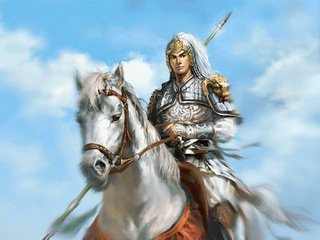 (A portrait of the famous 蜀 general, 趙雲. From Koei's latest version of the game, 三國志X)
(A portrait of the famous 蜀 general, 趙雲. From Koei's latest version of the game, 三國志X)三國演義 is what I consider to be my real introduction to Chinese culture and history. Prior to that, the Chinese language was just a necessary evil I had to overcome to progress up the next step of the education ladder. And ironically enough, this interest of mine only began towards the tail end of our mandatory 12-year Chinese syllabus. Therefore, I shall not divulge my sia suay Chinese grades here.
Despite what I've just said, I do recall a certain section in my old secondary two level Chinese text relating an episode supposedly from 三國演義. It contained a short story involving 張飛 (known for his fiery temper and short fuse) and 關羽 (known for his sense of loyalty and righteousness). For the uninitiated, 劉備, 關羽 and 張飛 were sworn brothers, and together were later to lay the foundations of 蜀國 (the other two 國s being 魏 and 吳).
As I was saying, the story goes that 關羽 had challenged 張飛 to killing ants (?!) crawling across their path. Whoever killed more ants in one swoop would be the winner, so says 關羽. 張飛 responded by pounding the ground with his fist. 關羽 did what we all would do, i.e. use our thumb. The moral of the story is broadly along the lines of "use your blain! use your blain!", but of course, my Chinese teacher put it across to us in a more politically correct manner.
Hardly inspiring stuff for a teenager, don't you think? If they had related the story of, for example, how the trio had became sworn brothers, my interest in Chinese culture might have been piqued earlier. I sure hope the current Chinese textbooks do not carry such cringe-inducing stories anymore. I will find out when 慧 starts schooling and complains about it.
As it turned out, it was a computer game that got me into 三國演義. Specifically, 三國志 by Koei in 1988 (check out the screenshots... the good old days of DOS). This game became a classic and went on to spawn a whole series (now in its tenth instalment) and indeed, a whole genre of its own (somebody actually bothered to count).
Back then, I just played the game and gave little heed to the characters and who they were. It was only whilst playing the 2nd instalment of the Koei game during my JC years that I got curious enough to want to read up on them. So I bought the original Chinese version of 三國演義 to read. You know, the version where the pages flip from left to right, where the words run vertically down and where you read from right to left. On my first complete reading of the book (took me six months), I understood at most only 40% of it. It was only on subsequent readings that I started to really get into the story. Now, I know the story inside out.
Indeed, knowledge of the story has made the game(s) much more enthralling for me. It should be obvious by now that I've gone on to play every instalment of the Koei series of 三國志. The recent instalments haven't been that impressive, although the graphics are really improved by leaps and bounds, as is expected.
So what is it about the story that fascinates me so? The English title of 三國演義 is Romance of the Three Kingdoms and yes, I do feel the romance in it. I know it is all testosterone and such. Women characters are few and far between and where they appear, they tended to be brief and suffered tragic endings, e.g. 貂蟬. For most avid followers of 三國, the main attractions are therefore the themes of brotherhood and power struggles as well as the colourfully painted battle and 單挑 scenes. Admittedly, these form part of its allure for me too. But the main attraction for me is not one of these.
It is what I feel to be the underlying theme of time. Or rather, the passing of it. Regardless of how much talent we possess, how much physical strength and skill we acquire, how much power we claim and accumulate, time will eventually claim us and be the ultimate victor. And what we leave behind are but our name and deeds.
You might have noticed by now that I keep referring to 三國演義 as a story. Yup, 三國演義 is not totally based on historical facts. It is partly fiction. For example, 關平, 關羽's 義子 in 三國演義, does not exist in history. The actual historical facts are recorded in 三國志, although I've been informed that this has a bias towards 魏國 because it was written by the historians of 魏! I've tried reading a bit of 三國志 but it is too simply cheem for me; My chinese not powderful enough.
三國演義 is actually an adapted version of 三國志 combined with some popular folklores. The author of it is 羅貫中. It contains strong biases towards 蜀國, reasons unknown. However, all of us 三國 followers still fall for it and love to admire all those 蜀 generals. Myself included. I suppose that's why it is such a famous work and is widely hailed as one of China's 四大名著. Online versions of both 三國演義 and 三國志 are readily available. Just do a simple search.
I've since gone beyond playing the games and reading the book. For one, I've watched that marvellous 84 episode China production of it. I recall fondly how back in 1995, I would rush home from army camp on every Saturday afternoon, egging and willing the bus all the way, just so that I can catch it on TV. I usually ended up missing the first 30 minutes or so of it. I made up for it later by watching the re-runs, and later the VCDs.
Then a few years later, I found this 三國志 comic series at our annual Chinese book fair and started collecting it. This series had created quite a buzz locally then, when it was just released, because it was quite well drawn and written. Unfortunately and disappointingly, we collectors of the series were sort of betrayed by the author and publisher. I still feel quite peeved when I think about it now.
I also have a set of 三國演義 stamps (see pics below). If you follow the link, you'll see the titles of the scenes each stamp is depicting. No, I am not a stamp collector, but couldn't resist getting my hands on these when I first saw them. They are the only set of stamps I own.
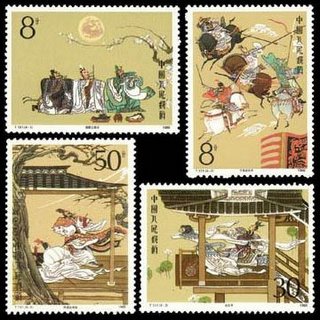
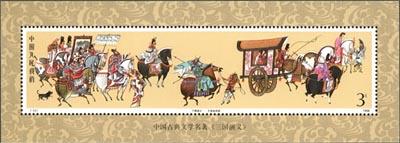
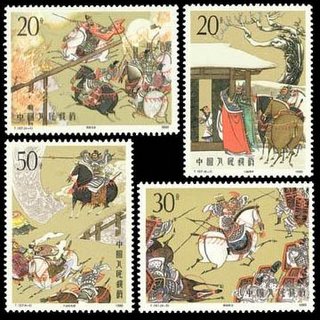
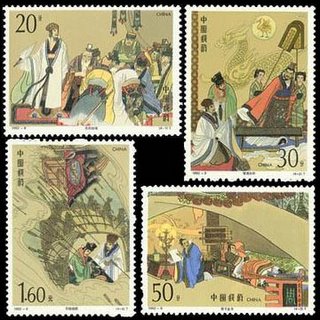


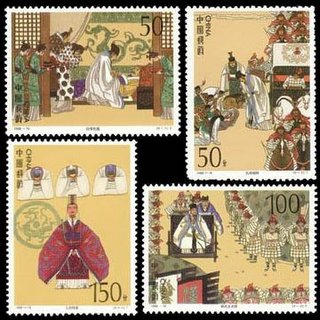
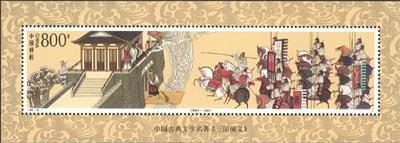
Then there is a set of 三國演義 poker cards. This, I treasure immensely. Partially because they are absolutely beautifully rendered. But more so because they were given to me as a birthday gift by Ah Gee (a uni friend I mentioned in a very early post), who had "割愛ed" from his personal collection (he collects poker cards) after finding out about my interest in all things 三國.
OK, now for the finale...
I own a medium-sized sculpture of 趙雲.
It was CUSTOM-MADE. (I'm not rich; Just allowed myself the occasional indulgence now and then)
Too bad I can't post pictures of it here because it is obviously in Singapore. The sculpture depicts 趙雲 riding a white horse with 啊斗 (劉備's son) wrapped up and asleep in his 戰袍. On his right hand is the 青釭劍, a 寶劍 plundered from one of 曹操's generals.
This is taken directly from the infamous scene of 長板橋 where 趙雲 had entered the masses of 曹操's army and singlehandedly saved his young master, 啊斗. It can be found in Chapter 41 of 三國演義 : 劉玄德攜民渡江,趙子龍單騎救主. Incidentally, the book is 120 chapters long.
It should also be obvious by now which 三國-era general I admire the most.
Akan Datang: Torch Light (part 2)
116 days to go.
P.S. 慧 knows that sculpture is 趙雲; I told her so. Every half year, when I go back for my break, I will ask her about it. She still remembers.
2nd P.S. I did say in previous posts I have some rather extreme and unusual hobbies...
Edit: The picture below was added on 11th May 2006. It was taken after my return home, thanks to the digital camera borrowed from my sis:
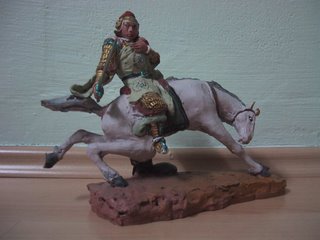 This is the sculpture of 趙雲 that I was talking about. Note his left hand, which is cradling 劉備's son, 啊斗.
This is the sculpture of 趙雲 that I was talking about. Note his left hand, which is cradling 劉備's son, 啊斗.
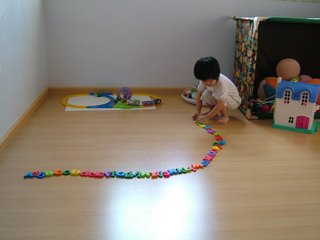

1 Comments:
Heh, thanks for the compliment.
By the way, those two words are read, yan3 yi4 in hanyu pinyin.
And thanks for dropping by too. *Grin*
Post a Comment
<< Home